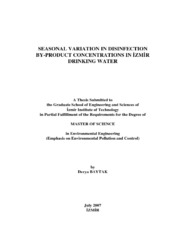Please use this identifier to cite or link to this item:
https://hdl.handle.net/11147/3824| Title: | Seasonal Variation in Disinfection By-Product Concentrations in Izmir Drinking Water | Authors: | Baytak, Derya | Advisors: | Sofuoğlu, Sait Cemil | Publisher: | Izmir Institute of Technology | Abstract: | The goal of this study was to investigate the seasonal variation in disinfection byproduct (DBP) concentrations in drinking water zmir. In accordance with this aim, drinking water samples were collected from tap water of five sampling points in the distribution system of three different water sources (Tahtalı Reservoir, Balçova Reservoir and ground water) during a 10 month period, from June 2006 to April 2007. The samples were analyzed by GC-ECD according to EPA Method 551.1. In addition, while the organic matter content (measured as NPOC) and bromide ion concentration were measured in samples from Tahtalı and Balçova Water Treatment Plants, other parameters including pH, temperature and chlorine dose were obtained from the treatment plants. These parameters were used as explanatory variables in the multivariate regression analysis to construct statistical models for DBPs. Trihalomethanes were the most abundant DBPs in all samples, followed by haloacetonitriles, chloropicrin and halogenated ketones. The mean total trihalomethanes (TTHMs) concentration of Balçova, Narlıdere and Güzelbahçe was 20.78 ppb while it was 94.71 ppb at Hatay. Concentrations of DBPs in all sampling locations were found to be the highest in spring and lowest in summer and fall. Although TTHM levels in all samples were found to be in accordance with the current drinking water regulations of Turkey, 41 % of the samples from Hatay exceeded the level that will be come into effect in 2012. Multivariate regression analysis suggested that water temperature and total chlorine dose were the most effective parameters for DBPs. In addition, simple regression analysis between total haloacetonitriles and TTHMs revealed a very high correlation (R2.0.83). Logistic regression models were able to predict the probability of exceedance of the selected TTHM thresholds with 76 % efficiency. | Description: | Thesis (Master)--Izmir Institute of Technology, Environmental Engineering, Izmir, 2007 Includes bibliographical references (leaves: 80-85) Text in English; Abstract: Turkish and English ix, 85 leaves |
URI: | http://hdl.handle.net/11147/3824 |
| Appears in Collections: | Master Degree / Yüksek Lisans Tezleri Sürdürülebilir Yeşil Kampüs Koleksiyonu / Sustainable Green Campus Collection |
Files in This Item:
| File | Description | Size | Format | |
|---|---|---|---|---|
| T000655.pdf | MasterThesis | 675.4 kB | Adobe PDF |  View/Open |
CORE Recommender
Page view(s)
282
checked on Jul 7, 2025
Download(s)
102
checked on Jul 7, 2025
Google ScholarTM
Check
Items in GCRIS Repository are protected by copyright, with all rights reserved, unless otherwise indicated.